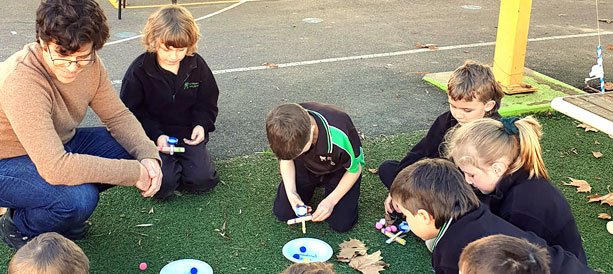In 2022 FLEET extended outreach activities to a number of regional and remote schools. Such schools have limited opportunities to engage with visiting scientists, or to and participate with them in hands-on science workshops.
Engagement with working scientists, and hands-on exercises, helps engage students’ curiosity, and exposes them to a greater breadth and depth of career opportunities in STEM and a deeper understanding of what real scientists do.
“Regional and remote students get limited opportunities for such engagement,” said FLEET outreach coordinator, Jason Major.
Jason, with Centre volunteers Ivan Herrera Benzaquen (Swinburne) and Tich-Lam Nguyen (Operations Team), engaged these rural future scientists’ brains and hands with experimental and problem-solving skills, and discussed FLEET science, and their own journeys to a career in science.
Go West. In-person school incursions in Vitoria’s Wimmera region
FLEET visited three schools in western Victoria, conducting hands-on workshops with primary students at Great Western and Moyston Primary Schools, and with year 7 students at Horsham College, plus a careers workshop with year 11 physics students from Horsham College.
The 260 budding scientists from the primary and year 7 levels got hands-on, building catapults and balloon rockets to explore Newton’s 2nd and 3rd laws, constructing model atoms and electronic circuits, and learning a little about FLEET’s research to develop low-energy electronics.
“Our evaluation showed the students enjoyed the experience,” said Jason.
“…doing work with Jason and Ivan has inspired me through electricity. Thank you.” (Primary student)
“The balloon was fun and I liked the way you had to problem solve.” (Primary student)
More importantly, there was a positive impact on student literacy and critical thinking about the science that underpinned each workshop.
FLEET’s evaluation showed a definitive shift in student understanding and learning about the physics concepts. Afterwards students could effectively recall and think critically about FLEET’s research problem of increasing energy consumption of digital technologies and the implications of that for society.
The experience was equally valuable for FLEET.
“It was as much a learning curve for me as for the students!” says Jason. “The first day exposed some flaws in the design of the pilot workshop that we were able to improve in subsequent school visits, with the help of the teachers.”
After the careers talk with Year 11 physics students, students’ perceptions of physics had changed, as had the value they placed on physics, and physicists.
FLEET presented an overview of FLEET research and gave students a virtual tour of FLEET labs before conducting mock interviews with Ivan and another FLEET member (PhD candidate, Karen Bayros) who joined the session online via Zoom.
Pre-evaluation indicated that students initially had a simple, abstract picture of physicists working to understand how the universe worked. There was no association with physicists’ and physics’ integral relationship with society and the technologies society relies on, or might need to rely on in the future.
This is typically reflected in one year 11 student’s comment when asked what comes to mind when you think of physics or physicists: “I think of theories, concepts and calculations to do with the universe”
After engagement, students gained a greater understanding of the discipline of physics: what it is, the breadth and depth of the discipline and its role in society. Students became more aware that physics is not an abstract field of research, but has real-world applications and implications for themselves and society, and that physicists develop actual technologies to solve problems, improve society, and shape humanity’s future.
“When I think of physicists I think of people involved in the research and development of new technologies and the discovery of new concepts.”
“When I think of what physicists to I believe they are trying to make new leading-edge things that can help shape the future.”
“Physicists require mathematical skills and logical thinking to accomplish their job. Computing plays a large role in physics
—Comments from students following the FLEET engagement
Deadly Learners
FLEET worked with Deadly Science on their Deadly Learners’ program to engage and share knowledge with indigenous students in remote communities. Jason Major registered as a STEM Professional with the Deadly Science Deadly Learners program, which is a virtual program that engages remote (mostly indigenous) students with STEM professionals in a variety of disciplines. Jason visited two remote schools in Northern Territory.
“It was two-way learning. I learned a bit about how indigenous kids perceive and interpret science and hopefully they got some insight and started to think a bit about how much energy their digital devices consume and how we might manage this, which was topical given the large solar farms being constructed near both schools,” says Jason
CSIRO STEM Professionals Remote and Regional Schools Program
Eleven FLEET members got involved in CSIRO’s STEM Professionals in Remote and Regional Schools program and worked with teachers in these schools across regional Victoria and NSW to conducted workshops, develop lesson plans and talk to students about their own journeys towards a career in physics.
Go East. FLEET in New Zealand
In early 2023, FLEET researchers will join partner organisation MacDiarmid in schools’ outreach in and around Rotorua NZ, again reaching schools that have rarely if ever hosted visiting scientists, as well as schools with a high proportion of indigenous (Māori) students and teaching frameworks.

